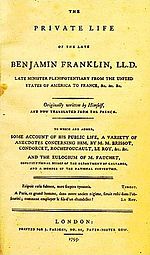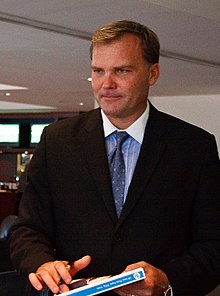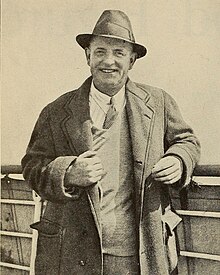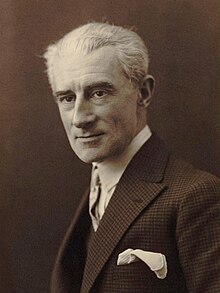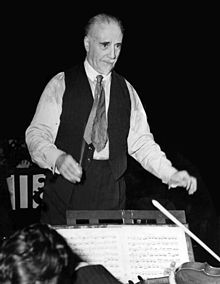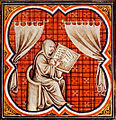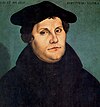Portal:Biography
The Biography Portal
A biography, or simply bio, is a detailed description of a person's life. It involves more than just basic facts like education, work, relationships, and death; it portrays a person's experience of these life events. Unlike a profile or curriculum vitae (résumé), a biography presents a subject's life story, highlighting various aspects of their life, including intimate details of experience, and may include an analysis of the subject's personality.
Biographical works are usually non-fiction, but fiction can also be used to portray a person's life. One in-depth form of biographical coverage is called legacy writing. Works in diverse media, from literature to film, form the genre known as biography.
An authorized biography is written with the permission, cooperation, and at times, participation of a subject or a subject's heirs. An autobiography is written by the person themselves, sometimes with the assistance of a collaborator or ghostwriter. (Full article...)
Featured biographies –
Harvey Bernard Milk (May 22, 1930 – November 27, 1978) was an American politician and the first openly gay man to be elected to public office in California, as a member of the San Francisco Board of Supervisors.
Milk was born and raised in New York. He acknowledged his homosexuality in adolescence but secretly pursued sexual relationships well into adulthood. The counterculture of the 1960s caused him to shed many of his conservative views about individual freedom and sexual expression. Milk moved to San Francisco in 1972 and opened a camera store. Although he held an assortment of jobs and frequently changed addresses, he settled in the Castro, a neighborhood that was experiencing a mass immigration of gay men and lesbians. He ran for city supervisor in 1973 but the existing gay political establishment resisted him. Milk's campaign was compared to theater due to his personality, earning media attention and votes, although not enough to be elected. He campaigned again in the next two supervisor elections, dubbing himself the "Mayor of Castro Street". The voter response caused him to also run for the California State Assembly. Due to his growing popularity, he led the gay rights movement in battles against anti-gay initiatives. Milk was elected city supervisor in 1977 after San Francisco began to choose neighborhood representatives rather than city-wide ones. During Milk's almost eleven months in office, he sponsored a bill banning discrimination based on sexual orientation in public accommodations, housing, and employment. The Supervisors passed the bill by a vote of 11–1, and Mayor George Moscone signed it into law. On November 27, 1978, Milk and Moscone were assassinated by Dan White, a disgruntled former city supervisor who cast the sole vote against Milk's bill. (Full article...)
Æthelwulf (Old English: [ˈæðelwuɫf]; Old English for "Noble Wolf"; died 13 January 858) was King of Wessex from 839 to 858. In 825, his father, King Ecgberht, defeated King Beornwulf of Mercia, ending a long Mercian dominance over Anglo-Saxon England south of the Humber. Ecgberht sent Æthelwulf with an army to Kent, where he expelled the Mercian sub-king and was himself appointed sub-king. After 830, Ecgberht maintained good relations with Mercia, and this was continued by Æthelwulf when he became king in 839, the first son to succeed his father as West Saxon king since 641.
The Vikings were not a major threat to Wessex during Æthelwulf's reign. In 843, he was defeated in a battle against the Vikings at Carhampton in Somerset, but he achieved a major victory at the Battle of Aclea in 851. In 853, he joined a successful Mercian expedition to Wales to restore the traditional Mercian hegemony, and in the same year, his daughter Æthelswith married King Burgred of Mercia. In 855, Æthelwulf went on a pilgrimage to Rome. In preparation he gave a "decimation", donating a tenth of his personal property to his subjects; he appointed his eldest surviving son Æthelbald to act as King of Wessex in his absence, and his next son Æthelberht to rule Kent and the south-east. Æthelwulf spent a year in Rome, and on his way back he married Judith, the daughter of the West Frankish king Charles the Bald. (Full article...)
Johann Josef Cajetan Graf von Klenau, Freiherr von Janowitz (Czech: Jan hrabě z Klenové, svobodný pán z Janovic; 13 April 1758 – 6 October 1819) was a field marshal in the Habsburg army. Klenau, the son of a Bohemian noble, joined the Habsburg military as a teenager and fought in the War of Bavarian Succession against Prussia, Austria's wars with the Ottoman Empire, the French Revolutionary Wars, and the Napoleonic Wars, in which he commanded a corps in several important battles.
In the early years of the French Revolutionary Wars, Klenau distinguished himself at the Wissembourg lines, and led a battle-winning charge at Handschuhsheim in 1795. As commander of the Coalition's left flank in the Adige campaign in northern Italy in 1799, he was instrumental in isolating the French-held fortresses on the Po River by organizing and supporting a peasant uprising in the countryside. Afterward, Klenau became the youngest lieutenant field marshal in the history of the Habsburg military. (Full article...)

Corinna or Korinna (Ancient Greek: Κόριννα, romanized: Korinna) was an ancient Greek lyric poet from Tanagra in Boeotia. Although ancient sources portray her as a contemporary of Pindar (born c. 518 BC), not all modern scholars accept the accuracy of this tradition. When she lived has been the subject of much debate since the early twentieth century, proposed dates ranging from the beginning of the fifth century to the late third century BC.
Corinna's works survive only in fragments: three substantial sections of poems are preserved on second-century AD papyri from Egypt; several shorter pieces survive in quotations by ancient grammarians. They focus on local Boeotian legends, and are distinctive for their mythological innovations. Corinna's poetry often reworks well-known myths to include details not known from any other sources. Though respected in her hometown, Tanagra, and popular in ancient Rome, modern critics have often regarded her as parochial and dull; her poetry is nonetheless of interest as she is one of the few female poets from ancient Greece whose work survives. (Full article...)
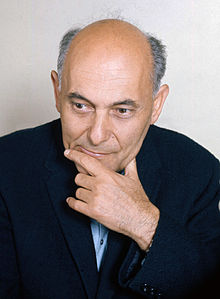
Sir Georg Solti KBE (/dʒɔːrdʒ ˈʃɒlti/ JORJ SHOL-tee, Hungarian: [ˈʃolti]; born György Stern; 21 October 1912 – 5 September 1997) was a Hungarian-British orchestral and operatic conductor, known for his appearances with opera companies in Munich, Frankfurt, and London, and as a long-serving music director of the Chicago Symphony Orchestra. Born in Budapest, he studied there with Béla Bartók, Leó Weiner, and Ernő Dohnányi. In the 1930s, he was a répétiteur at the Hungarian State Opera and worked at the Salzburg Festival for Arturo Toscanini. His career was interrupted by the rise of the Nazis' influence on Hungarian politics, and being Jewish, he fled the increasingly harsh Hungarian anti-Jewish laws in 1938. After conducting a season of Russian ballet in London at the Royal Opera House, he found refuge in Switzerland, where he remained during the Second World War. Prohibited from conducting there, he earned a living as a pianist.
After the war, Solti was appointed musical director of the Bavarian State Opera in Munich in 1946. In 1952, he moved to the Oper Frankfurt, where he remained in charge for nine years. He took West German citizenship in 1953. In 1961, he became musical director of the Covent Garden Opera Company, London. During his 10-year tenure, he introduced changes that raised standards to the highest international levels. Under his musical directorship, the status of the company was recognised with the grant of the title "the Royal Opera". He became an honorary citizen of the coastal holiday town of Castiglione della Pescaia, and a British citizen in 1972. (Full article...)
John LaRue Helm (July 4, 1802 – September 8, 1867) was the 18th and 24th governor of the U.S. Commonwealth of Kentucky, although his service in that office totaled less than fourteen months. He also represented Hardin County in both houses of the Kentucky General Assembly and was chosen to be the Speaker of the Kentucky House of Representatives four times. In 1838, his sole bid for federal office ended in defeat when his opponent, Willis Green, was elected to the U.S. House of Representatives.
Helm was first elected to the Kentucky House of Representatives in 1826; between 1826 and 1843 he served eleven one-year terms in the state house. In 1844, he was elected to the state senate, where he served continuously until he was chosen as the Whig Party nominee for lieutenant governor on a ticket with John J. Crittenden, famous for the Crittenden Compromise. The Whigs won the general election and Helm was elevated to governor on July 31, 1850, when Crittenden resigned to accept an appointment as United States Attorney General in President Millard Fillmore's cabinet. After his service as governor Helm became president of the struggling Louisville and Nashville Railroad. He invested thousands of dollars of his own money in the project and convinced residents along the line's main route to buy stock in the company. In 1859, the line was completed, but the next year Helm resigned over of differences with the board of directors regarding a proposed branch that would extend the line to Memphis, Tennessee. (Full article...)

(Achille) Claude Debussy (French: [aʃil klod dəbysi]; 22 August 1862 – 25 March 1918) was a French composer. He is sometimes seen as the first Impressionist composer, although he vigorously rejected the term. He was among the most influential composers of the late 19th and early 20th centuries.
Born to a family of modest means and little cultural involvement, Debussy showed enough musical talent to be admitted at the age of ten to France's leading music college, the Conservatoire de Paris. He originally studied the piano, but found his vocation in innovative composition, despite the disapproval of the Conservatoire's conservative professors. He took many years to develop his mature style, and was nearly 40 when he achieved international fame in 1902 with the only opera he completed, Pelléas et Mélisande. (Full article...)
Vivien Leigh (/liː/ LEE; born Vivian Mary Hartley; 5 November 1913 – 8 July 1967), styled as Lady Olivier after 1947, was a British actress. She won the Academy Award for Best Actress twice, for her performances as Scarlett O'Hara in Gone with the Wind (1939) and Blanche DuBois in the film version of A Streetcar Named Desire (1951), a role she had also played on stage in London's West End in 1949. She also won a Tony Award for her work in the Broadway musical version of Tovarich (1963). Although her career had periods of inactivity, in 1999 the American Film Institute ranked Leigh as the 16th-greatest female movie star of classic Hollywood cinema.
After completing her drama school education, Leigh appeared in small roles in four films in 1935 and progressed to the role of heroine in Fire Over England (1937). Lauded for her beauty, Leigh felt that her physical attributes sometimes prevented her from being taken seriously as an actress. Despite her fame as a screen actress, Leigh was primarily a stage performer. During her 30-year career, she played roles ranging from the heroines of Noël Coward and George Bernard Shaw comedies to classic Shakespearean characters such as Ophelia, Cleopatra, Juliet and Lady Macbeth. Later in life, she performed as a character actress in a few films. (Full article...)
Thierry Daniel Henry (French pronunciation: [tjɛʁi danjɛl ɑ̃ʁi]; born 17 August 1977) is a French professional football coach, pundit, sports broadcaster and former player. He is considered one of the greatest strikers of all time, and one of the greatest players in Premier League history. He has been named by Arsenal as the club's greatest ever player. Henry was runner-up for both the Ballon d'Or in 2003 and the FIFA World Player of the Year in 2003 and 2004. He was named the FWA Footballer of the Year a record three times, the PFA Players' Player of the Year a joint-record two times, and was named in the PFA Team of the Year six consecutive times. He was also included in the FIFA FIFPro World XI once and the UEFA Team of the Year five times. In 2004, Henry was named by Pelé in the FIFA 100 list of the world's greatest living players.
Henry made his professional debut with Monaco in 1994 before signing for defending Serie A champions Juventus. However, limited playing time, coupled with disagreements with the club's hierarchy, led to him signing for Premier League club Arsenal for £11 million in 1999. Under long-time mentor and coach Arsène Wenger, Henry became a prolific striker and Arsenal's all-time leading scorer with 228 goals in all competitions. He won the Premier League Golden Boot a record four times, won two FA Cups and two Premier League titles with the club, including one during an unbeaten Invincible season. Henry spent his final two seasons with Arsenal as club captain, leading them to the 2006 UEFA Champions League Final. Henry transferred to Barcelona in 2007 and in the 2008–09 season, he was a key part of the club's historic treble when they won La Liga, the Copa del Rey, and the UEFA Champions League. In 2010, he joined Major League Soccer (MLS) club New York Red Bulls and returned to Arsenal on loan for two months in 2012, before retiring in 2014. (Full article...)
